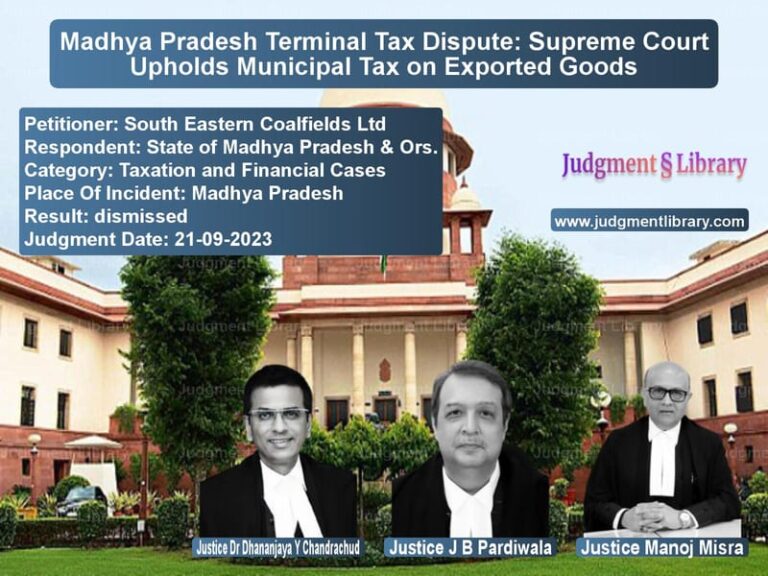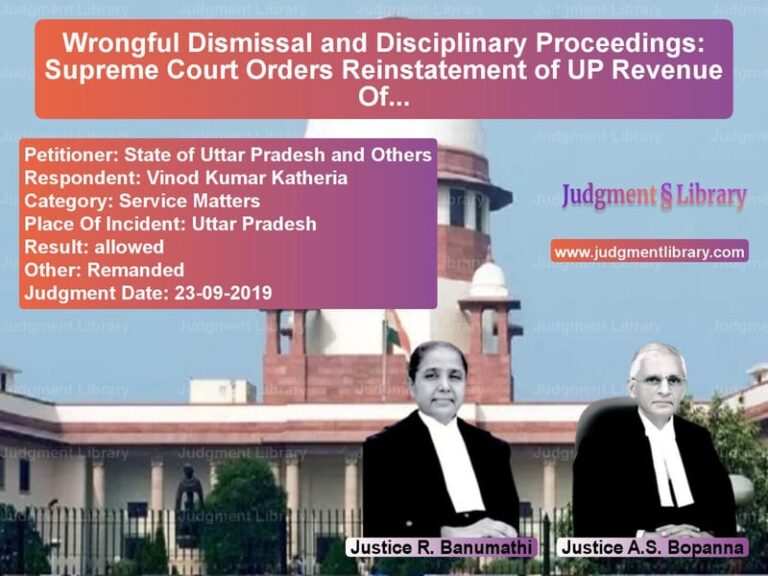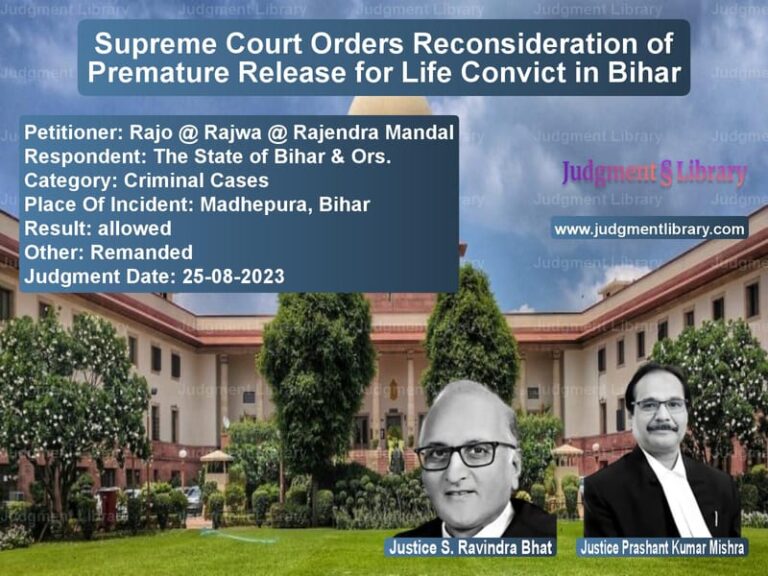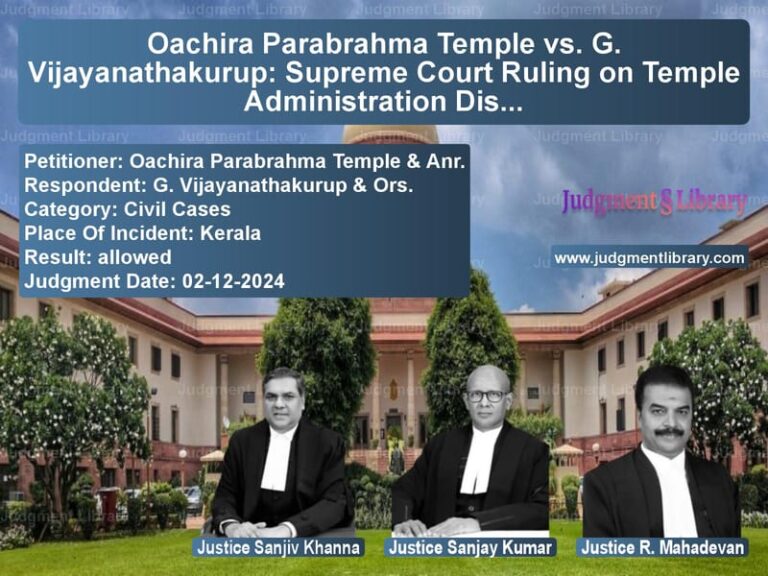Irretrievable Breakdown of Marriage: Supreme Court Expands Divorce Jurisdiction
The Supreme Court of India, in the case of Shilpa Sailesh vs. Varun Sreenivasan, addressed significant legal issues concerning the dissolution of marriage under Article 142(1) of the Constitution of India. The Court deliberated on whether it could exercise its powers to waive the mandatory waiting period under Section 13-B(2) of the Hindu Marriage Act, 1955, and whether it could grant divorce even when one spouse opposes it, based on the doctrine of ‘irretrievable breakdown of marriage.’
Background of the Case
The case arose from a set of transfer petitions filed by spouses seeking dissolution of their marriage under mutual consent. The core issue revolved around the judicial power of the Supreme Court under Article 142(1) to grant divorce while bypassing the procedural and substantive provisions of the Hindu Marriage Act.
Multiple cases were tagged with the petition, highlighting the growing legal debate on whether courts could dissolve a marriage that had completely failed, even if one party did not consent. The petitioners argued that the current framework often prolonged legal battles unnecessarily, causing mental agony.
Legal Issues Considered
The Supreme Court framed three main legal questions:
- What is the scope and ambit of the Supreme Court’s power under Article 142(1) of the Constitution of India?
- Can the Court, while exercising its jurisdiction, waive the statutory waiting period under Section 13-B(2) of the Hindu Marriage Act?
- Can the Court grant divorce in cases of complete and irretrievable breakdown of marriage, even when one spouse opposes the petition?
Petitioner’s Arguments
The petitioners contended that:
- The mandatory six-month waiting period under Section 13-B(2) serves no purpose when parties have lived separately for years and have mutually decided to end their marriage.
- Judicial delays often force couples into prolonged litigation, exacerbating mental distress.
- There should be recognition of ‘irretrievable breakdown of marriage’ as a valid ground for divorce, even if one spouse does not consent.
- Article 142 empowers the Supreme Court to provide ‘complete justice,’ which includes granting divorce without procedural constraints.
Respondent’s Arguments
The respondents, opposing the waiver of the cooling-off period and the idea of unilateral divorce, argued that:
- The existing provisions of the Hindu Marriage Act do not include ‘irretrievable breakdown of marriage’ as a ground for divorce.
- Granting divorce solely on the request of one spouse violates the principles of marriage as a social institution.
- Waiving the statutory period may set a precedent for hasty divorces, undermining reconciliation efforts.
- The power under Article 142 should not override substantive statutory provisions without legislative sanction.
Supreme Court’s Observations
Judicial Power Under Article 142(1)
The Court observed that Article 142(1) gives it broad discretionary powers to ensure complete justice. While acknowledging that this power should be exercised with caution, the Court reaffirmed that it has the authority to depart from statutory procedures where necessary.
Waiver of the Waiting Period
Referring to its earlier judgment in Amardeep Singh v. Harveen Kaur, the Court ruled that the six-month waiting period under Section 13-B(2) of the Hindu Marriage Act is not mandatory. The Court can waive this period if it finds that:
- The couple has been living separately for a considerable period.
- There is no chance of reconciliation.
- The settlement terms regarding alimony, child custody, and other financial matters are finalized.
Irretrievable Breakdown of Marriage
The Court acknowledged that while ‘irretrievable breakdown of marriage’ is not a statutory ground under the Hindu Marriage Act, it has been applied in exceptional cases. The Court ruled that:
- When a marriage has been emotionally and physically dead for years, forcing the parties to stay legally married serves no purpose.
- The Court has the power to dissolve a marriage even if one spouse objects, provided the facts show that reconciliation is impossible.
- Factors such as prolonged separation, lack of cohabitation, and ongoing litigation should be considered.
Final Judgment
The Supreme Court ruled that:
- The six-month waiting period under Section 13-B(2) can be waived at the discretion of the Court.
- Divorce can be granted under Article 142(1) even when one spouse refuses consent, provided the marriage is irretrievably broken.
- The Court’s power under Article 142(1) is not restrained by statutory provisions if its application serves complete justice.
Key Takeaways
- Judicial Discretion in Divorce Cases: The ruling empowers the Supreme Court to expedite divorce proceedings when the mandatory waiting period serves no practical purpose.
- Recognition of Irretrievable Breakdown: The judgment paves the way for legal acknowledgment of failed marriages, preventing unnecessary litigation.
- Balance Between Law and Equity: The decision ensures that statutory procedures do not become barriers to justice.
- Implications for Family Law Reform: The ruling may influence future legislative amendments to formally include irretrievable breakdown as a divorce ground.
Conclusion
The Supreme Court’s judgment in Shilpa Sailesh vs. Varun Sreenivasan marks a significant step toward judicial reform in matrimonial laws. By allowing waiver of the cooling-off period and recognizing irretrievable breakdown of marriage, the Court has reinforced its commitment to doing complete justice in family disputes.
Petitioner Name: Shilpa Sailesh.Respondent Name: Varun Sreenivasan.Judgment By: Justice Sanjiv Khanna, Justice Sanjay Kishan Kaul, Justice Abhay S. Oka, Justice Vikram Nath, Justice J.K. Maheshwari.Place Of Incident: India.Judgment Date: 01-05-2023.
Don’t miss out on the full details! Download the complete judgment in PDF format below and gain valuable insights instantly!
Download Judgment: shilpa-sailesh-vs-varun-sreenivasan-supreme-court-of-india-judgment-dated-01-05-2023.pdf
Directly Download Judgment: Directly download this Judgment
See all petitions in Mutual Consent Divorce
See all petitions in Alimony and Maintenance
See all petitions in Child Custody
See all petitions in Property Division in Divorce Cases
See all petitions in Judgment by Sanjiv Khanna
See all petitions in Judgment by Sanjay Kishan Kaul
See all petitions in Judgment by Abhay S. Oka
See all petitions in Judgment by Vikram Nath
See all petitions in Judgment by J.K. Maheshwari
See all petitions in allowed
See all petitions in supreme court of India judgments May 2023
See all petitions in 2023 judgments
See all posts in Divorce Cases Category
See all allowed petitions in Divorce Cases Category
See all Dismissed petitions in Divorce Cases Category
See all partially allowed petitions in Divorce Cases Category







